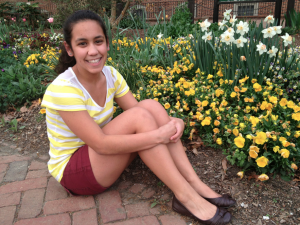 Age: 22Hometown: Irvine, CA
Future residence: Denver, CO (starting in August)
College of William and Mary, 2013
Kinesiology and Health Sciences
Age: 22Hometown: Irvine, CA
Future residence: Denver, CO (starting in August)
College of William and Mary, 2013
Kinesiology and Health Sciences
Tina Fischel is about to make a big move. At the end of the summer, she will relocate to Colorado to work as a health educator for the Metro Community Provider Network (MCPN), an affiliate of the Health Corps. While there, she will work in a clinical setting among health professionals. Her duties include conducting individual patient consultations on nutrition, diabetes and smoking, and helping to educate a community of historically underserved Spanish-speaking refugees and migrant workers.
Fischel is very excited to see her academic and professional paths converge. For the past eight years, she has been organizing and fundraising for Relay for Life. She is passionate about fulfilling the American Cancer Society’s mission to reduce incidents of cancer, as well as the suffering that comes from cancer.
When she was an EMT, Fischel was exposed to the realities that aren’t necessarily visible to the rest of society.
“[As an EMT] you’re going into people’s homes uninvited and you see things like addiction and poverty. You also see people coming into the ER as a first and last resort,” she explains. The experience shed light on just how complex and inefficient modern healthcare is.
“If I can contribute to a solution or remedy, that’s what I want to do,” Fischel adds. She is motivated to enact change in healthcare, particularly at the community level.
“What inspires me is the people who do it best. When someone does [their job] right, you notice. The patients notice and the people around notice,” Fischel states. Fischel is referring to the 'human connection' that sometimes is lacking in primary and preventative care. This connection includes giving patients the full attention and time that they deserve in order to address their individual diagnoses. She will strive to work in this manner once she’s in her new role in Denver.
When asked about her Fil-Am identity, Fischel looks back on her time before college.
“In my past, my only connection was the fact that I was brown,” she laughs. Fischel’s mom is from the Philippines, while her dad is of Eastern European descent. Growing up, they’d have Adobo once a month, which was always something Fischel and her siblings looked forward to. When she transferred from UCLA to William and Mary for her sophomore year, she joined the Filipino American Student Association. It was a positive experience, because not only did she learn about Pilipino history and culture, but also saw just how hospitable Pilipinos can be.
“Even though we are not in the Philippines, we are [known for being] welcoming. People around the world notice it, too,” Fischel remarks.
Fischel describes how it’s been a goal of hers to live in Colorado. After casually mentioning it to a friend who worked for AmeriCorps, she was encouraged to apply for the position in Denver. As of a result of what may appear to be a stroke of luck, Fischel offers the following advice to other emerging Fil-Ams and Pilipinos.
“You can’t just give up and settle. Don’t be afraid to look to other people for inspiration. You can gain direction from your peers, and you shouldn’t be afraid of that.”



